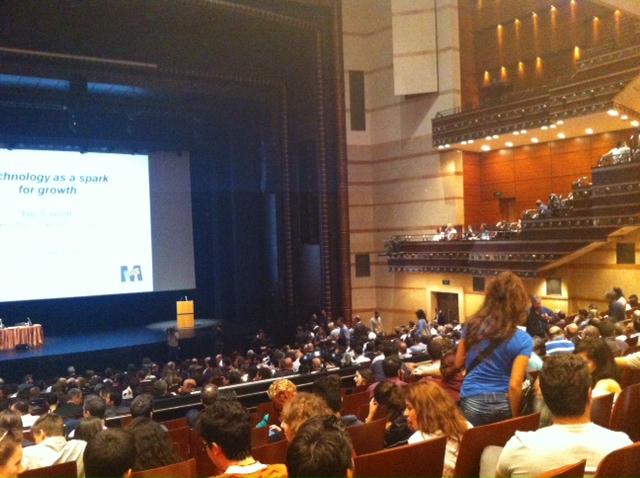Photo: FOSPHOTOS/Panayiotis Tzamaros
Anastasia Balezdrova
"The bad thing is behind Greece and now you are faced with a unique opportunity provided by the crisis, namely to find new ways, principles and means to achieve development," said the Executive Chairman of technology giant Google, Eric Schmidt, in Athens.
He delivered a lecture on "Technology as a spark for development" in a hall of the Athens Concert Hall Megaron overcrowded with young people, a few hours after his meeting with Greek Prime Minister Antonis Samaras.
According to Schmidt, the most serious problem Greece has to tackle is unemployment and the solution to the crisis lies in innovation. "The country has a large number of qualified employees who can be the staff of new companies in the field of technology." He supported the establishment of new companies that will create new jobs.
"The demographic changes on a global scale are not encouraging since fewer productive people have to work for the pensions of more people. Unemployment is a problem in all countries, to a greater or lesser extent, and the solution can only come from innovation."
Eric Schmidt turned to the past to support his thesis that the future is in the hands of high technology. "Industrialization which, in the 19th century, increased the gross domestic product 33 times is gone forever. At the same time, the demographic changes on a global scale are not encouraging since fewer productive people have to work for the pensions of more people. Unemployment is a problem in all countries, to a greater or lesser extent, and the solution can only come from innovation."
In this regard, Schmidt said that the view that technology limits the number of workers is a myth. "The opposite is true as research results show that one job in the field of new technology creates another five jobs in other industries," he said.
Eric Schmidt stated that he had raised the issue during his meeting with Antonis Samaras, "who showed understanding of what I said, and supports the creation of new jobs in the field of high technology."

He urged the Greek government to remove all bureaucratic obstacles that are hampering the people who want to create new companies. "The necessary things for this are new ideas, access to capital and the removal of bureaucratic obstacles. Usually, different laws and regulations do not allow the creation of incentives for risk-taking by entrepreneurs," said Eric Schmidt. Then he urged young entrepreneurs in Greece to push for changes in company law, tax reductions and for the acceptance of a different attitude in terms of a potential failure of new ventures.
"If you do not compete in the international market you just drop behind. Globalization and competition will continue to develop," said Schmidt, noting that Greece is lagging behind in terms of digital technology and the Internet economy. "It is time to change that, to increase the use of the Internet in the public and private sector and to turn this country into a Mecca of high technology."

He defined the Google team in Greece as one of the fastest growing in the world and in terms of a potential investment of the company in Greece he said, "We are considering different things and we will see what our choice will be."
"There are no limits to human creativity. Those people who work with computers are becoming smarter and therefore more productive. In the future the subjects of our work will be more fun and will allow us to be in constant contact with each other."
Google’s president also spoke about the power of networks and the exchange of information, pointing out that the majority of the machines are part of a huge network of artificial intelligence which is creating scalable solutions that are changing everything already familiar. "There are no limits to human creativity. Those people who work with computers are becoming smarter and therefore more productive. In the future the subjects of our work will be more fun and will allow us to be in constant contact with each other. Globalization tells us that we cannot go on another planet. Therefore we need to expand existing markets and create new networks." According to Eric Schmidt, the knowledge economy has brought more work but it will be replaced with more creative economies at the centre of which will be man. In his words, this process is already underway and it has found a way to make profits.
At the end of his speech, he called for the introduction of more creativity, freedom and technology in educational systems.